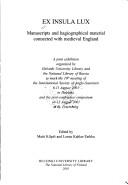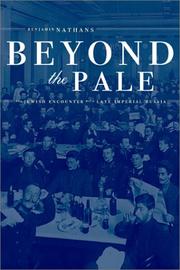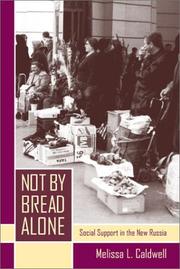| Listing 1 - 10 of 13 | << page >> |
Sort by
|
Book
ISBN: 5857591813 9785857591819 Year: 2003 Volume: 4 Publisher: Moskva: Izd-vo "Indrik",
Abstract | Keywords | Export | Availability | Bookmark
 Loading...
Loading...Choose an application
- Reference Manager
- EndNote
- RefWorks (Direct export to RefWorks)
Book
ISBN: 1501716336 1501716360 Year: 2019 Publisher: Ithaca, NY : Cornell University Press,
Abstract | Keywords | Export | Availability | Bookmark
 Loading...
Loading...Choose an application
- Reference Manager
- EndNote
- RefWorks (Direct export to RefWorks)
In this original and timely assessment of cultural expressions of paranoia in contemporary Russia, Eliot Borenstein samples popular fiction, movies, television shows, public political pronouncements, internet discussions, blogs, and religious tracts to build a sense of the deep historical and cultural roots of konspirologiia that run through Russian life. Plots against Russia reveals through dramatic and exciting storytelling that conspiracy and melodrama are entirely equal-opportunity in modern Russia, manifesting themselves among both pro-Putin elites and his political opposition. As Borenstein shows, this paranoid fantasy until recently characterized only the marginal and the irrelevant. Now, through its embodiment in pop culture, the expressions of a conspiratorial worldview are seen everywhere. Plots against Russia is an important contribution to the fields of Russian literary and cultural studies from one of its preeminent voices.
National characteristics, Russian. --- Post-communism --- Paranoia --- Conspiracy theories --- Political culture --- Popular culture --- Social aspects --- Social aspects --- konspirologiia. --- modern Russia. --- paranoia. --- pop culture. --- pro-Putin elites.
Book
ISBN: 9781501716362 9781501716355 9781501716331 9781501735776 1501716352 1501716360 1501716336 1501735772 Year: 2019 Publisher: Ithaca, N.Y. Cornell University Press
Abstract | Keywords | Export | Availability | Bookmark
 Loading...
Loading...Choose an application
- Reference Manager
- EndNote
- RefWorks (Direct export to RefWorks)
In this original and timely assessment of cultural expressions of paranoia in contemporary Russia, Eliot Borenstein samples popular fiction, movies, television shows, public political pronouncements, internet discussions, blogs, and religious tracts to build a sense of the deep historical and cultural roots of konspirologiia that run through Russian life. Plots against Russia reveals through dramatic and exciting storytelling that conspiracy and melodrama are entirely equal-opportunity in modern Russia, manifesting themselves among both pro-Putin elites and his political opposition. As Borenstein shows, this paranoid fantasy until recently characterized only the marginal and the irrelevant. Now, through its embodiment in pop culture, the expressions of a conspiratorial worldview are seen everywhere. Plots against Russia is an important contribution to the fields of Russian literary and cultural studies from one of its preeminent voices.
Sociology of culture --- Political sociology --- Mass communications --- Pragmatics --- Russia --- National characteristics, Russian. --- Post-communism --- Paranoia --- Conspiracy theories --- Political culture --- Popular culture --- Social aspects --- konspirologiia. --- modern Russia. --- paranoia. --- pop culture. --- pro-Putin elites.
Book
ISBN: 0520947878 1282764071 9786612764073 9780520947870 0520262840 9780520262843 0520262859 9780520262850 Year: 2011 Publisher: Berkeley University of California Press
Abstract | Keywords | Export | Availability | Bookmark
 Loading...
Loading...Choose an application
- Reference Manager
- EndNote
- RefWorks (Direct export to RefWorks)
Dacha Idylls is a lively account of dacha life and how Russians experience this deeply rooted tradition of the summer cottage amid the changing cultural, economic, and political landscape of postsocialist Russia. Simultaneously beloved and reviled, dachas wield a power that makes owning and caring for them an essential part of life. In this book, Melissa L. Caldwell captures the dacha's abiding traditions and demonstrates why Russians insist that these dwellings are key to understanding Russian life. She draws on literary texts as well as observations from dacha dwellers to highlight this enduring fact of Russian culture at a time when so much has changed. Caldwell presents the dacha world in all its richness and complexity-a "good life" that draws inspiration from the natural environment in which it is situated.
Gardening --- Organic living --- Vacation homes --- Country homes --- Russia (Federation) --- Social life and customs. --- anthropology. --- changing landscape. --- cultural anthropology. --- dacha dwellers. --- dacha life. --- dachas. --- economic landscape. --- ethnography. --- gardening. --- good life. --- literary influence. --- modern history. --- modern russia. --- natural environment. --- nonfiction. --- postsocialist russia. --- rural settings. --- russia. --- russian culture. --- russian history. --- russian life. --- russian politics. --- russian traditions. --- simple life. --- social cultural. --- summer cottage. --- traditional cottages. --- traditional dwellings.
Book
ISBN: 1644692813 Year: 2020 Publisher: Boston, MA : Academic Studies Press,
Abstract | Keywords | Export | Availability | Bookmark
 Loading...
Loading...Choose an application
- Reference Manager
- EndNote
- RefWorks (Direct export to RefWorks)
After years of leaving her husband and children behind in Seattle as she traveled back and forth to Russia pursuing a career, Elisa Brodinsky Miller discovers she's writing her own chapter in a book of three generations. Shortly after her father's death, Elisa discovers a cache of letters written in Russian and Yiddish among his belongings, which she quickly resolves to translate. Dated from 1914 to 1922 and addressed to her grandfather, Eli, in Wilmington, Delaware, the letters capture the eight long years that Eli spent apart from his wife and their six children who remained behind in the Pale of Settlement. With each translation, Brodinsky Miller learns more about this time spent apart, the family she knew so little about, and the country they came to leave behind, connecting her own experiences with those who came before her. This captivating memoir bridges the past with the present, as we learn about her grandparents' drives to escape the Jewish worlds of Tsarist Russia, her immigrant parents' hopes for their marriage in America, and now her turn to reach for meaning and purpose: each a generation of aspirations-first theirs, now hers.
Jewish women --- Families. --- Miller, Elisa Brodinsky --- Family. --- Biography. --- Eastern Europe. --- Family/career conflict. --- Generational legacies. --- Jewish identity. --- Jewish women. --- Judaism. --- Memoir. --- Modern Russia. --- Russian Far East. --- Russian Ukraine. --- Seattle. --- Shtetl life. --- Tillie Olsen. --- Ukrainian Jews. --- Washington. --- Yiddish. --- career. --- family history. --- genealogy. --- gulag. --- history. --- introspection. --- investigative journalism. --- journalism. --- marriage. --- motherhood. --- personal narrative. --- research. --- travel. --- womanhood. --- writing.

ISBN: 9521000120 9789521000126 Year: 2001 Publisher: Helsinki: Helsinki university library,
Abstract | Keywords | Export | Availability | Bookmark
 Loading...
Loading...Choose an application
- Reference Manager
- EndNote
- RefWorks (Direct export to RefWorks)
Manuscripts, English (Old) --- Manuscripts, Latin (Medieval and modern) --- Manuscripts, Medieval --- Helsingin yliopisto. --- Rossiĭskai︠a︡ nat︠s︡ionalʹnai︠a︡ biblioteka --- Manuscripts, English (Old) - Finland - Helsinki - Exhibitions --- Manuscripts, Latin (Medieval and modern) - Finland - Helsinki - Exhibitions --- Manuscripts, English (Old) - Russia - Saint Petersburg - Exhibitions --- Manuscripts, Latin (Medieval and modern) - Russia - Saint Petersburg - Exhibitions --- Manuscripts, Medieval - England - Exhibitions --- Angleterre --- Université --- Helsinki --- Catalogue de manuscrits --- Bibliothèque nationale --- Saint-Pétersbourg --- Manuscrits hagiographiques --- Hagiographie
Book
ISBN: 9785819204245 5819204247 Year: 2012 Publisher: Sankt-Peterburg Rossijskaia nacional'naia biblioteka
Abstract | Keywords | Export | Availability | Bookmark
 Loading...
Loading...Choose an application
- Reference Manager
- EndNote
- RefWorks (Direct export to RefWorks)
Manuscripts, Latin (Medieval and modern) --- Rossiĭskai︠a︡ nat︠s︡ionalʹnai︠a︡ biblioteka --- 091 <47 ST.-PETERSBURG> --- Medieval and modern Latin manuscripts --- Manuscripts, Medieval --- 091 <47 ST.-PETERSBURG> Handschriftenkunde. Handschriftencatalogi--Rusland. Sovjet-Unie--ST.-PETERSBURG --- Handschriftenkunde. Handschriftencatalogi--Rusland. Sovjet-Unie--ST.-PETERSBURG --- Rossiĭskai︠a︡ nat︠s︡ionalʹnai︠a︡ biblioteka --- Российская национальная библиотека --- Russia (Federation). --- РНБ --- RNB --- Biblioteca nazionale di Russia --- Bibliothèque nationale de Russie --- Russian National Library --- National Library of Russia --- Roshia Kokuritsu Toshokan --- Gosudarstvennai︠a︡ publichnai︠a︡ biblioteka imeni M.E. Saltykova-Shchedrina --- Manuscripts, Latin (Medieval and modern) - Russia (Federation) - Saint Petersburg - Catalogs --- Saint-Pétersbourg --- Catalogue de manuscrits --- Bibliothèque nationale

ISBN: 1282759302 9786612759307 0520931297 1597344931 9780520931299 0520208307 9780520208308 0520242327 9780520242326 9781597344937 Year: 2002 Publisher: Berkeley Los Angeles University of California Press
Abstract | Keywords | Export | Availability | Bookmark
 Loading...
Loading...Choose an application
- Reference Manager
- EndNote
- RefWorks (Direct export to RefWorks)
A surprising number of Jews lived, literally and figuratively, "beyond the Pale" of Jewish Settlement in tsarist Russia during the half-century before the Revolution of 1917. Thanks to the availability of long-closed Russian archives, along with a wide range of other sources, Benjamin Nathans reinterprets the history of the Russian-Jewish encounter.In the wake of Russia's "Great Reforms," Nathans writes, a policy of selective integration stimulated social and geographic mobility among the empire's Jews. The reaction that culminated, toward the turn of the century, in ethnic restrictions on admission to universities, the professions, and other institutions of civil society reflected broad anxieties that Russians were being placed at a disadvantage in their own empire. Nathans's conclusions about the effects of selective integration and the Russian-Jewish encounter during this formative period will be of great interest to all students of modern Jewish and modern Russian history.
Jews --- Hebrews --- Israelites --- Jewish people --- Jewry --- Judaic people --- Judaists --- Ethnology --- Religious adherents --- Semites --- Judaism --- History --- Cultural assimilation --- Russia --- Ethnic relations. --- Jews -- Russia -- History -- 19th century.. --- Jews -- Russia (Federation) -- Saint Petersburg -- History -- 20th century.. --- Jews -- Cultural assimilation -- Russia.. --- Russia -- Ethnic relations. --- archival. --- archives. --- central europe. --- contemporary history. --- contemporary. --- cultural history. --- cultural studies. --- culture. --- european history. --- geography. --- jewish history. --- jewish studies. --- jewish. --- judaism. --- modern history. --- modern russia. --- religion. --- religious persecution. --- revolution of 1917. --- russia. --- russian history. --- russian jew. --- russian revolution. --- social studies. --- tsarist russia. --- world history.
Book
ISBN: 5860074581 9785860074583 Year: 2005 Publisher: Saint-Petersburg Bulanin
Abstract | Keywords | Export | Availability | Bookmark
 Loading...
Loading...Choose an application
- Reference Manager
- EndNote
- RefWorks (Direct export to RefWorks)
Manuscripts, Latin (Medieval and modern) --- Rossiĭskai︠a︡ nat︠s︡ionalʹnai︠a︡ biblioteka --- 091 <47 ST.-PETERSBURG> --- 091 =71 --- Medieval and modern Latin manuscripts --- Manuscripts, Medieval --- 091 <47 ST.-PETERSBURG> Handschriftenkunde. Handschriftencatalogi--Rusland. Sovjet-Unie--ST.-PETERSBURG --- Handschriftenkunde. Handschriftencatalogi--Rusland. Sovjet-Unie--ST.-PETERSBURG --- 091 =71 Handschriftenkunde. Handschriftencatalogi--Latijn --- Handschriftenkunde. Handschriftencatalogi--Latijn --- Rossiĭskai︠a︡ nat︠s︡ionalʹnai︠a︡ biblioteka --- Российская национальная библиотека --- Russia (Federation). --- РНБ --- RNB --- Biblioteca nazionale di Russia --- Bibliothèque nationale de Russie --- Russian National Library --- National Library of Russia --- Roshia Kokuritsu Toshokan --- Gosudarstvennai︠a︡ publichnai︠a︡ biblioteka imeni M.E. Saltykova-Shchedrina --- Rossiĭskai͡a nat͡sionalʹnai͡a biblioteka --- Manuscripts, Latin (Medieval and modern) - Russia (Federation) - Saint Petersburg - Catalogs --- Saint-Pétersbourg --- Catalogue de manuscrits --- Bibliothèque nationale

ISBN: 0520937252 1282762958 1597347787 9786612762956 9780520937253 1417508264 9781417508266 0520238753 9780520238756 0520238761 9780520238763 9781597347785 Year: 2004 Publisher: Berkeley : University of California Press,
Abstract | Keywords | Export | Availability | Bookmark
 Loading...
Loading...Choose an application
- Reference Manager
- EndNote
- RefWorks (Direct export to RefWorks)
What Muscovites get in a soup kitchen run by the Christian Church of Moscow is something far more subtle and complex-if no less necessary and nourishing-than the food that feeds their hunger. In Not by Bread Alone, the first full-length ethnographic study of poverty and social welfare in the postsocialist world, Melissa L. Caldwell focuses on the everyday operations and civil transactions at CCM soup kitchens to reveal the new realities, the enduring features, and the intriguing subtext of social support in Russia today.In an international food aid community, Caldwell explores how Muscovites employ a number of improvisational tactics to satisfy their material needs. She shows how the relationships that develop among members of this community-elderly Muscovite recipients, Russian aid workers, African student volunteers, and North American and European donors and volunteers-provide forms of social support that are highly valued and ultimately far more important than material resources. In Not by Bread Alone we see how the soup kitchens become sites of social stability and refuge for all who interact there-not just those with limited financial means-and how Muscovites articulate definitions of hunger and poverty that depend far more on the extent of one's social contacts than on material factors.By rethinking the ways in which relationships between social and economic practices are theorized-by identifying social relations and social status as Russia's true economic currency-this book challenges prevailing ideas about the role of the state, the nature of poverty and welfare, the feasibility of Western-style reforms, and the primacy of social connections in the daily lives of ordinary people in post-Soviet Russia.
Poor --- Food relief --- Social networks --- Soup kitchens --- Disadvantaged, Economically --- Economically disadvantaged --- Impoverished people --- Low-income people --- Pauperism --- Poor, The --- Poor people --- Persons --- Social classes --- Poverty --- Famine relief --- Food aid programs --- Food assistance programs --- Disaster relief --- Humanitarian assistance --- Public welfare --- Emergency food supply --- Networking, Social --- Networks, Social --- Social networking --- Social support systems --- Support systems, Social --- Interpersonal relations --- Cliques (Sociology) --- Microblogs --- Kitchens, Soup --- Economic conditions --- Russia (Federation) --- Social conditions --- Soupes populaires --- Réseaux sociaux --- Aide alimentaire --- Pauvres --- Russie --- Conditions sociales --- Food distribution programs --- anthropology. --- charity. --- christian church of moscow. --- economic policies. --- ethnographic study. --- ethnography. --- hunger. --- international food aid. --- material needs. --- modern russia. --- moscow. --- muscovites. --- new russia. --- nonfiction. --- post soviet russia. --- postsocialist world. --- poverty. --- refuge. --- russia. --- russian aid workers. --- social currency. --- social practices. --- social relationships. --- social status. --- social support. --- social welfare. --- soup kitchens. --- students and teachers. --- volunteers. --- welfare. --- western reform.
| Listing 1 - 10 of 13 | << page >> |
Sort by
|

 Search
Search Feedback
Feedback About UniCat
About UniCat  Help
Help News
News